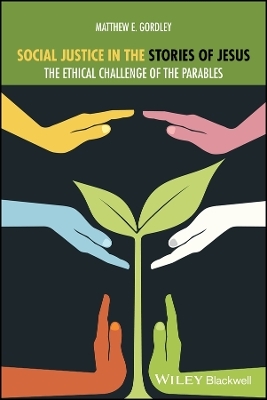
Social Justice in the Stories of Jesus
Wiley-Blackwell (Verlag)
978-1-119-88402-6 (ISBN)
Social Justice in the Stories of Jesus introduces readers to the parables of the New Testament while exploring how they relate to social justice, ethics, and key issues of modern society. Centering on themes of mercy, justice, and human dignity, this unique volume invites readers to reflect on the meaning of Jesus's parables both in their original setting and in the context of present-day moral and ethical challenges. The author discusses social justice concepts from various traditions to enable readers to engage with the ethical implications of the parables in a range of different contexts.
Each chapter focuses on one parable or set of parables, such as the parable of the Good Samaritan and the parable of the Pharisee and the Tax Collector, and includes historical background information and an analysis and interpretation of the parable. Throughout the text, the author highlights the connections between Jesus's parables and racism, violence, poverty, the environment, our obligations to one another, and other timely social justice issues.
Blends an accessible overview of the parables of Jesus with an introduction to social justice and ethics
Explores New Testament parables as viewed through the lens of contemporary writers, ethicists, and activists
Emphasizes the Jewish roots of the parables and the need to guard against anti-Jewish readings of the parables
Highlights the ways that Jesus’s parables challenged his first-century listeners to see their world in new ways and recognize the dignity of every person
Engages with seminal thinkers in contemporary social justice, such as James Cone, Howard Thurman, Emilie Townes, Bishop Michael Curry, and Pope Francis
Includes study and discussion questions for personal and group use
Requiring no prior knowledge of the subject, Social Justice in the Stories of Jesus: The Ethical Challenge of the Parables is an ideal textbook for introductory courses on the Bible and New Testament, faith-based courses on ethics, and general Christian readers looking for an excellent resource for personal or congregational study.
“Gordley’s excellent book on the parables of Jesus is utterly unique, focusing largely on their contemporary ethical significance, helpfully using modern Roman Catholic scholarship in crafting this highly recommended text.” — David Aune, Walter Professor of New Testament and Christian Origins Emeritus, University of Notre Dame.
“This book incorporates socially conscious and justice seeking hermeneutics. Grounded in mercy ethics, it reorients biblical scholarship by making explicit the socioethical and praxiological demands embedded in New Testament parables.” — Néstor Medina, Associate Professor of Religious Ethics and Culture, Emmanuel College, University of Toronto.
“Social Justice in the Stories of Jesus is an invitation into an engaging conversation about the Parables of Jesus that is both timeless and timely. Practical applications abound, and discussion questions are provided if the text is used in group settings.” — Julia A. Upton, Former Distinguished Professor of Theology, St. John’s University.
“Gordley’s excellent book on the parables of Jesus is utterly unique, focusing largely on their contemporary ethical significance, helpfully using modern Roman Catholic scholarship in crafting this highly recommended text.” — David Aune, Walter Professor of New Testament and Christian Origins Emeritus, University of Notre Dame“Gordley’s excellent book on the parables of Jesus is utterly unique, focusing largely on their contemporary ethical significance, helpfully using modern Roman Catholic scholarship in crafting this highly recommended text.” — David Aune, Walter Professor of New Testament and Christian Origins Emeritus, University of Notre Dame
MATTHEW E. GORDLEY is Interim Provost and Dean of the College of Arts and Sciences at Carlow University. He has written extensively on interpreting the New Testament and early Jewish texts with careful attention to their historical, social, and cultural contexts. His work has been published in the Journal of Biblical Literature, Journal of Ancient Judaism, Journal of Jewish Studies, and Catholic Biblical Quarterly, among others.
Preface xiii
Acknowledgment vii
1 Reading the Parables through the Lens of Social Justice 1
1. Introduction 1
2. What Are Parables? 8
3. Why Parables? 13
4. The Parables as They Were Originally Heard 17
5. Parables and Mercy: An Entry Point into Social Justice 20
6. Exploring the Ethical Implications of the Parables through a Social Justice Lens 24
7. Reading the Parables through the Lens of Social Justice: A Proposal 32
2 Encountering the World and Words of Jesus 39
1. Introduction 39
2. Exploring Other Worlds: Some Key Concepts 41
3. The World of Jesus 42
Religious Context: Early Judaism 42
Sociopolitical Context: An Advanced Agrarian Society within the Roman Empire 54
4. The Words of Jesus 60
5. Words about Jesus 73
The Actions and Example of Jesus 74
Death and Resurrection 75
6. Postscript: Jesus and Crucified Peoples Today 78
3 The Parable of the Good Samaritan (Luke 10:25–37) 83
1. Introduction 83
2. The Text: Parable of the Good Samaritan (Luke 10:25–37) 85
3. Our First Step: Grasp the Story 85
4. Our Second Step: Going Deeper through Asking Questions 87
What Can We Know about the Characters? 87
Good Samaritan … and Bad Jews? 90
5. Our Third Step: Spot the Twist 92
6. Our Fourth Step: Consider the Metaphor 94
7. Our Fifth Step: Articulate the Challenge 98
8. Our Final Step: Consider Implications 102
Physical Care for Those in Need: The Corporal Works of Mercy 103
The Natural World 105
The Humanity of Our Enemies 106
4 Lost Sheep, Lost Coin (Luke 15:4–10) 109
1. Introduction 109
2. The Text: Lost Sheep, Lost Coin (Luke 15:4–10) 110
3. Our First Step: Grasp the Stories 110
4. Our Second Step: Ask Questions to Gain Understanding 112
What Glimpse Does Each Parable Give Us into Economic Realities in the First Century? 113
5. Our Third Step: Spot the Twist 115
6. Our Fourth Step: Consider the Metaphor 118
Lost and Found 123
Communal Rejoicing 124
7. Our Fifth Step: Articulate the Challenge 126
8. Our Sixth Step: Consider Implications 129
5 The Lost Sons (Luke 15:11–32) 136
1. Introduction 136
2. The Text: The Lost Sons (Luke 15:11–32) 136
3. Our First Step: Grasp the Story 137
4. Our Second Step: Ask Questions to Gain Understanding 142
5. Our Third Step: Spot the Twist 151
6. Our Fourth Step: Consider the Metaphor 153
7. Our Fifth Step: Articulate the Challenge 157
8. Our Sixth Step: Consider implications 163
6 The Parable of the Mustard Seed (Mark 4:30–32) 174
1. Introduction 174
2. The Text: The Parable of the Mustard Seed (Mark 4:30–32) 176
3. Our First Step: Grasp the Story 176
4. Our Second Step: Ask Good Questions 178
5. Our Third Step: Spot the Twist 183
6. Our Fourth Step: Consider the Metaphor 184
7. Our Fifth Step: Articulate the Challenge 187
8. Our Sixth Step: Consider Implications 192
7 The Pharisee and the Tax Collector (Luke 18:9–14) 202
1. Introduction 202
2. The Text: The Pharisee and the Tax Collector (Luke 18:9–14) 203
3. Our First Step: Grasp the Story 203
4. Our Second Step: Ask Questions to Gain Understanding 207
5. Our Third Step: Spot the Twist 214
6. Our Fourth Step: Consider the Metaphor 215
7. Our Fifth Step: Articulate the Challenge 219
8. Our Sixth Step: Consider Implications 221
8 The Laborers in the Vineyard (Matthew 20:1–16) 232
1. Introduction 232
2. The Text: The Laborers in the Vineyard (Matthew 20:1–16) 233
3. Our First Step: Grasp the Story 233
4. Our Second Step: Ask Questions to Gain Understanding 235
5. Our Third Step: Spot the Twist 238
6. Our Fourth Step: Consider the Metaphor 240
7. Our Fifth Step: Articulate the Challenge 245
Jon Sobrino and Ignacio Ellacuría 246
8. Our Sixth Step: Consider Implications 248
9 The Rich Man and Lazarus (Luke 16:19–31) 257
1. Introduction 257
2. The Text: The Rich Man and Lazarus (Luke 16:19–31) 258
3. Our First Step: Grasp the Story 259
4. Our Second Step: Going Deeper through Asking Questions 261
5. Our Third Step: Spot the Twist 266
6. Our Fourth Step: Consider the Metaphor 268
7. Our Fifth Step: Articulate the Challenge 274
8. Our Final Step: Consider Implications 277
Conclusion: Living into Our Humanity and Cultivating an Ethic of Love, Mercy, and Justice 282
1. Introduction 282
2. Summary of the Parables 285
3. Shared Themes throughout the Parables of Jesus 288
4. Conversation Partners 294
5. An Ethic of Love, Mercy, and Justice 302
Appendix 1: Sisters of Mercy Reflections on the Parables 309
Appendix 2: Questions for Individual Study and Group Discussion 326
Bibliography 333
Index 341
| Erscheinungsdatum | 16.01.2024 |
|---|---|
| Reihe/Serie | Lived Religions |
| Verlagsort | Hoboken |
| Sprache | englisch |
| Maße | 152 x 226 mm |
| Gewicht | 522 g |
| Themenwelt | Religion / Theologie ► Christentum ► Kirchengeschichte |
| Religion / Theologie ► Christentum ► Moraltheologie / Sozialethik | |
| ISBN-10 | 1-119-88402-0 / 1119884020 |
| ISBN-13 | 978-1-119-88402-6 / 9781119884026 |
| Zustand | Neuware |
| Haben Sie eine Frage zum Produkt? |
aus dem Bereich


